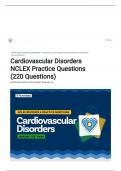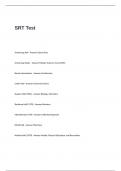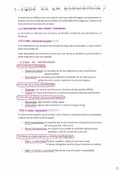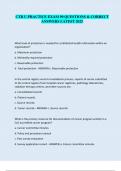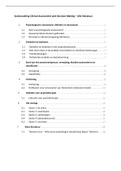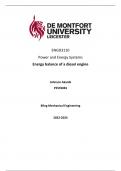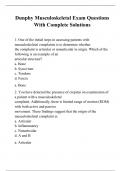Unit 4, April – July 2021 M.A.W. Janssen
Montabon, F., Pagell, M., & Wu, Z. (2016). Making sustainability
sustainable. Journal of Supply Chain Management, 52(2), 11-27.
Abstract
The vast majority of research and practice regarding sustainable supply chains has followed an
instrumental logic, which has led firms and supply chain managers to place economic interests ahead
of environmental and social interests. Evidence that firms are attempting to become less
unsustainable is mounting, but compensating practices such as offsetting a supply chain’s negative
impact on the environment and society do not create truly sustainable supply chains. This conceptual
study seeks to move the field from the question of how can firms merely diminish environmental or
social problems to how supply chains can become truly sustainable. To that end, we review the major
weaknesses in previous logics and develop an Ecologically Dominant logic where environment and
social interests supersede economic interests. To encourage a wider adoption of our perspective, the
study illustrates how the Ecologically Dominant logic can advance practice and research. We do this
by providing examples drawn from practice and our previous research and by offering propositions
to encourage future research.
Introduction
Previous research on sustainable supply chains has generally been framed using an instrumental logic
that asks how can a supply chain benefit from addressing environmental or social issues as compared
to how can a supply chain become sustainable. This can be observed in the multiple literature
reviews on the link between being more sustainable and economic performance. The relationships of
interest in these reviews are explicit test of an instrumental logic where one constructs, becoming
more environmentally or socially sustainable, influences another, such as profits or some other type
of economic performance. The key to the instrumental logic is that economic performance is the
goal, not sustainability.
The emphasis on finding shared value, win-win outcomes or determining when it pays to be green
has certainly moved the field forward, and our intent is not to dismiss the progress that has been
made in the last 30 years. However, previous research has noted that an instrumental logic
dominated by economics, especially as manifested as profit. In this paper, we offer an alternative
logic, which we call Ecologically Dominant (ED), that we argue can lead to truly sustainable supply
chains. This study is aimed primarily at researchers with the idea that if the logic that guides research
changes, then changes in practice will follow.
The instrumental logic has two significant weaknesses and motivates this study to offer an
alternative. First, this logic is backward looking in that it studies exiting unsustainable supply chains
to determine what they are doing to become less unsustainable. Second, while sustainable supply
chain research is ostensibly aimed at the entire chain and all of its stakeholders, the reality is that it is
usually conducted from the perspective of a local firm.
The Ecologically Dominant (ED) logic presented in this study is explicit in its priorities when trade-offs
are encountered and is aimed at creating a truly sustainable supply chain, not at reducing the harm
from a single focal firm. Because of the fact that economic and social issues are nested inside
environmental issues. When trade-offs are inevitably encountered, the priority is to protect the
environment, then society and only then to consider profits.
The Ecological Dominant (ED) logic is developed based on by the principals of Whetten (1989),
Sutton and Staw (1995), and Weick (1995). We theorize by building on previous concepts and
,Sustainable Supply Chain Management Master Supply Chain Management
Unit 4, April – July 2021 M.A.W. Janssen
making use of previous findings to first explain why existing logics do not lead to sustainability. From
there, the new logic is developed by combining conceptual theorizing with rich narratives to develop
propositions embedded in the Ecologically Dominant logic and supported by empirical data from
cases.
The Need for a New Logic
To build a new way of thinking, we must consider culture, logic, and cognition. Culture is typically
viewed as an organization’s or society’s values, beliefs, and ideology. Culture is built on the deeper
level of logics and cognition, which are often preconscious and complex combinations of problem-
solving routines and cognitive elements such as assumptions and decision-making rubrics. Logic
occurs at the institutional level of analysis while cognitions are typically firm or individual level;
institutional logics drive organizational and individual cognitions and decisions. In this study, logic
refers to the framework(s) that guide research and practice in sustainable supply chain management.
Cognitions are driven by the logic but occur at the individual, firm or supply chain level, and reflect
how decisions are made within the supply chain. We have chosen the term “cognition” rather than
“paradigm” because the former connotes a process that is more internal to an individual, while the
latter can be seen as more external.
Our primary thesis follows Gao and Bansal (2013) in that we maintain that the instrumental logic that
underpins the current understanding of the TBL has limited progress toward sustainability.
Therefore, we suggest the Ecologically Dominant logic as a means of achieving sustainability. We
argue that the Ecologically Dominant logic will engender different cognitions, decisions, and
outcomes.
Sustainable as a (Potentially) Integrated Logic
The Triple Bottom Line (TBL) has been a dominant concept in sustainable research. A common
definition of the TBL is “an accounting framework that incorporates three dimensions of
performance: social, environmental and financial”. The TBL aspires to treat each of its three aspects
with equal importance. It is thus not surprising that some researchers use TBL as a synonym for
sustainability. Using the TBL as a means of capturing a chain’s performance is, conceptually,
integrative in that the TBL includes all of a supply chain’s impacts. Thus, the TBL seems to align well
with stakeholder theory since capturing all of a chain’s impacts implies capturing how a chain affects
all of its stakeholders.
The Natural Resource-Based View (NRBV), which is an integrative theory of sustainability with the
natural environment as a key constraint, was proposed in 1995 by Hart. His follow-up (Hart and
Dowell, 2011) noted that research was still too focused on short-term economic gains from being
green. They identified a problem noted by others, that sustainability research and practice has
mainly been done in an instrumental fashion focusing on a single firm or single supply chain
becoming less unsustainable. Sustainable should be addressed and measure in an integrative fashion
to account for the impacts on all stakeholders and both the TBL and NRBV are conceptually
integrative. However, there is little research and even less practice that occurs in this manner. Some
of the literature attempts to deal with this issue by finding “wins” for all aspects of sustainability.
Win-Win Perspectives
Win-win is a recurring theme in sustainability research. Porter’s (1991) explanation of win-win was
perhaps the first sustainability concept to get wide notice in the business research literature. The
conflict between environmental protection and economic competitiveness is a false dichotomy. In
other words, firms and supply chains can be environmentally friendly and make a profit. This win-win
,Sustainable Supply Chain Management Master Supply Chain Management
Unit 4, April – July 2021 M.A.W. Janssen
perspective has been very influential in research, especially research on the “does it pay to be green”
question.
A new form of the win-win perspective can be found in Porter and Kramer’s (2006, 2011) concept of
creating share value (CSV), which they define as “policies and operating practices that enhance the
competitiveness of a company while simultaneously advancing the economic and social conditions in
the communities in which it operates”. This concept, similar to the TBL, attempts to give the three
aspects of sustainability equal importance; unfortunately, practice has shown the limitations of this
concept.
Win-win is attractive in that it suggests that the demands on supply chains to be socially and
environmentally responsible are actually opportunities to increase profits. However, while there are
certainly win-win opportunities, creating truly sustainable supply chains will involve both changes
that have win-win outcomes and changes hat will force trade-offs that are inevitable given the
complex nature of sustainability. “By following the win-win paradigm sustainability issues are
ultimately judged through the lens of profit maximization rather than being treated as ends in
themselves”. To date, the economic aspects of sustainability has won out over the social and
environmental aspects.
The TBL and win-win are fine in theory, but not in practice. The former in practice is not treating each
of the three elements equally and the latter does not resolve trade-offs in a sustainable way. As
research following current logics does not appear to be creating sustainable supply chains, our
conclusion is that a new logic is needed.
Development of a New Logic
The Brundtland Commission’s definition of sustainability as “Development that meets the needs of
the present without compromising the ability of future generations to meet their own needs” is a
good starting point for developing a new logic as this definition gives greater emphasis to social and
environmental impacts and recognized longer time frames than current instrumental logics. Update
the previous definition with addition of Griggs argument provides “Development that meets the
needs of the present while safeguarding Earth’s life-support system, on which the welfare of current
and future generations depend”.
The environment is the central constraint of our proposed Ecologically Dominant logic. A functioning
ecosystem is necessary for mankind’s survival. Although reducing harm may slow the rate of decline,
recognizing the importance of a functioning ecosystem explicitly acknowledges that society must
move beyond slowing unsustainability to becoming sustainable.
We next turn too the social aspect of sustainability, which is our second constraint after the
environment. For people to thrive, social systems for employment, health, housing, and overall
quality of life will need to be supported by the environment. All environmental issues have social
consequences, but not all social issues are environmental issues. The social system is dependent on
the environmental system; hence, it is subservient too it in the Ecologically Dominant logic.
Similarly, the economic system is subservient to the social system. A functioning economic system
should contribute to higher quality of life. The Ecologically Dominant logic is clear, however, that the
protection of social systems and increasing quality of life are the real goals. Increased profits for
members of a supply chain or increased GDP for an economy are a means, but not the only means, of
protecting or improving society, and economic gains that harm society are not sustainable economic
gains.
, Sustainable Supply Chain Management Master Supply Chain Management
Unit 4, April – July 2021 M.A.W. Janssen
Table 1 summarises the differences between the current sustainability logic and the proposed
Ecologically Dominant logic. The Ecologically Dominant logic no longer treats business and society as
a trade-off between two competing variables or a zero-sum game, but rather speaks of the natural
connection between the variables and suggest the presence of potential synergies. Another way in
which the Ecologically Dominant logic diverges is that they propose an integrative logic that does not
emphasize one performance outcome over another.
In summary, sustainability is not conceptually instrumental, but it is generally researched and
implemented in an instrumental manner that gives primacy to profits over environmental and social
outcomes. This then creates a feedback loop where becoming less unsustainable is conflated with
becoming sustainable, effectively enabling organizational irresponsibility any time there is a trade-off
between profits and other outcomes. The Ecologically Dominant logic explicitly places profits in a
subservient position to the environment and society. Adopting the Ecologically Dominant logic will
likely lead to significant creative destruction, starting with the instrumental logic that has led to
unsustainable supply chains. The new logic should drive research in new directions. Table 2
summarizes the type of research questions asked under the instrumental and Ecologically Dominant
logics.



